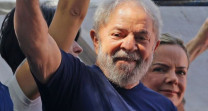A trip to Kramerbooks, Mr Obama?
Not only fighting landscape within Syria fragmented, external state actors with fingers in the situation are varied.

The writer is Editor, National Security Affairs at Capital TV and a visiting fellow at SDPI
The legal-normative questions of such use by the government forces — if this is true — and the outrage expressed by the US require a separate debate and are being debated. One can, for instance, ask how the US would have reacted if she was on the side of Assad (hint: Iraq vs Iran). But I shall not dwell on that aspect of the war that currently rages within Syria. My question, for the purpose of this article, is rather simple: how would such strikes be helpful in terms of addressing the situation in that country and, by extension, increase security for all state actors within and outside the region?
The answer to this simple question is rather complex. The use of force, in a rational framework, must advance some ‘purpose’ (political objective); everything else, as Clausewitz asserted, works towards that and which is achieved through ‘aim’, the many battles that will be fought to add up to that purpose. Seen from this perspective, to what end (purpose) does Obama want to work through conducting missile strikes?
Capt Emile Simpson, a British infantry officer, in a recent book War From the Ground Up lays down a new concept of today’s wars. He calls it “combat as politics” and argues that any “use of the armed force that directly seeks political, as opposed to specifically military, outcomes ... lies beyond the scope of war in its traditional paradigm”.
This is an incisive observation and is empirically tested by the wars in Iraq and Afghanistan. One can argue that Obama wants to conduct specific strikes, which then begs the question: will the selective use of force, given the fragmented nature of the war and its actors, manage “to establish military conditions for a political solution”, a concept normally associated with war’s traditional paradigm?
The answer to this question seems in the negative. This is how Capt Simpson puts the problem:
“Strategic confusion can result when conflicts characterised by competition between many actors in a fragmented political environment are shoehorned into a traditional concept of war, with its two polarised sides. This fragmented competition may involve organised violence on a large scale, but is fundamentally different from war in the traditional sense: in many contemporary conflicts, armed force seeks to have a direct political effect on audiences rather than setting condition for a political solution through military effect against the enemy.”
To me, like Iraq and Afghanistan, more Afghanistan than Iraq, Syria seems to fit the bill apropos of the fragmented political environment that Simpson is talking about and which makes the application of armed force in a traditional set of thinking useless and dangerous. Not only is the fighting landscape within fragmented, the external state actors with their fingers in the situation are varied with everyone jockeying for advantage. All have different interests and are pursuing their own agendas even as the conflict, in terms of the violence being generated, appears polarised.
So, while we may, for the purpose of convenience call it Assad versus the Rebels, the actual situation is very different in terms of the numbers of actors and their motives for fighting. Let me put it this way: were the Assad regime to vanish today, the opposition fighting his regime will not get together and form a democratic government. These groups will not only fight among themselves, dragging on the war, but the spillover of the fighting will be expedited. This, despite the fact that the Assad regime’s hands are bloodied and it is an abomination.
Nor is there victory and defeat in these wars. Each actor interprets the meaning of these terms according to his own prism. Or as Simpson says: “‘War’ does not decide who wins and loses.” He has a remarkable vignette in the book:
“In April 1975 in Hanoi, a week before the fall of Saigon, Colonel Harry Summers of the US Army told his North Vietnamese counterpart Colonel Tu, ‘You never beat us on the battlefield’, to which Tu replied, ‘That may be so, but it is also irrelevant’.”
This, as Simpson argues and which students of modern wars have long understood, “emphasises how the application and adjustment of the interpretive template of war when used in reality is as much an instrument of war as the use of force within it”.
Last November, speaking at the Quaid-e-Azam University on The Changing Nature of War, I had argued that while it is vital to understand how war is changing, it is equally important to understand why people fight and set their own rules in the battlefield to gain an asymmetric advantage. Such understanding is imperative because, as James Fearon noted in an article in International Security, “If wars are costly ex post then some explanation is needed for why a compromise cannot be found ex ante.”
It is well to try and make a case for wanted and unwanted wars and to see whether there are any ‘Pareto-efficient’ wars but history belies the claim that wars only happen through a rational calculus. Even when actors calculate the risks, they will never have perfect information — nor will they, or can, factor in unintended consequences. This is what Clausewitz called the ‘fog of war’.
Syria has become a wicked problem. And as I have noted elsewhere, using the framework developed by Horst Rittel and Melvin Webber in a 1973 article, “A wicked problem is generally one that is either difficult or almost impossible to solve because of contradictory and changing requirements and where information is incomplete. To add to the degree of difficulty, a wicked problem involves complex interdependencies, such that tackling one aspect of the problem can create other problems.”
I’d suggest that Obama give a onceover to that article and one of his staff run over to Kramerbooks on Dupont Circle and buy a copy of Simpson’s book while Congress debates his request and the UN inspectors try to figure out if the Assad (not A-saad) regime did use chemical munitions, thank you.
Published in The Express Tribune, September 4th, 2013.
Like Opinion & Editorial on Facebook, follow @ETOpEd on Twitter to receive all updates on all our daily pieces.



















COMMENTS
Comments are moderated and generally will be posted if they are on-topic and not abusive.
For more information, please see our Comments FAQ